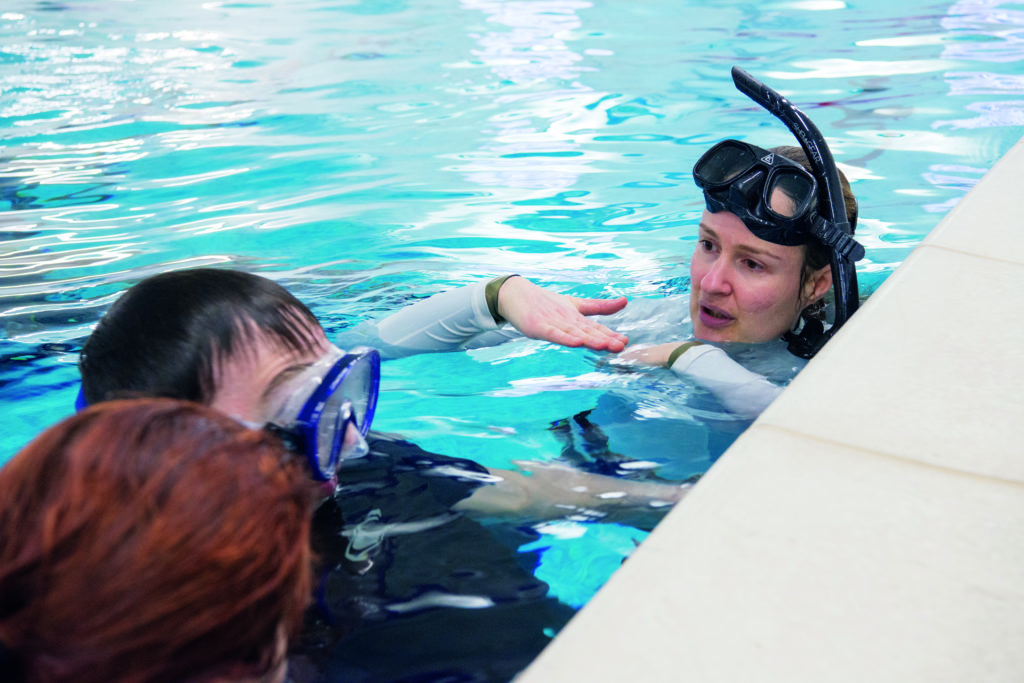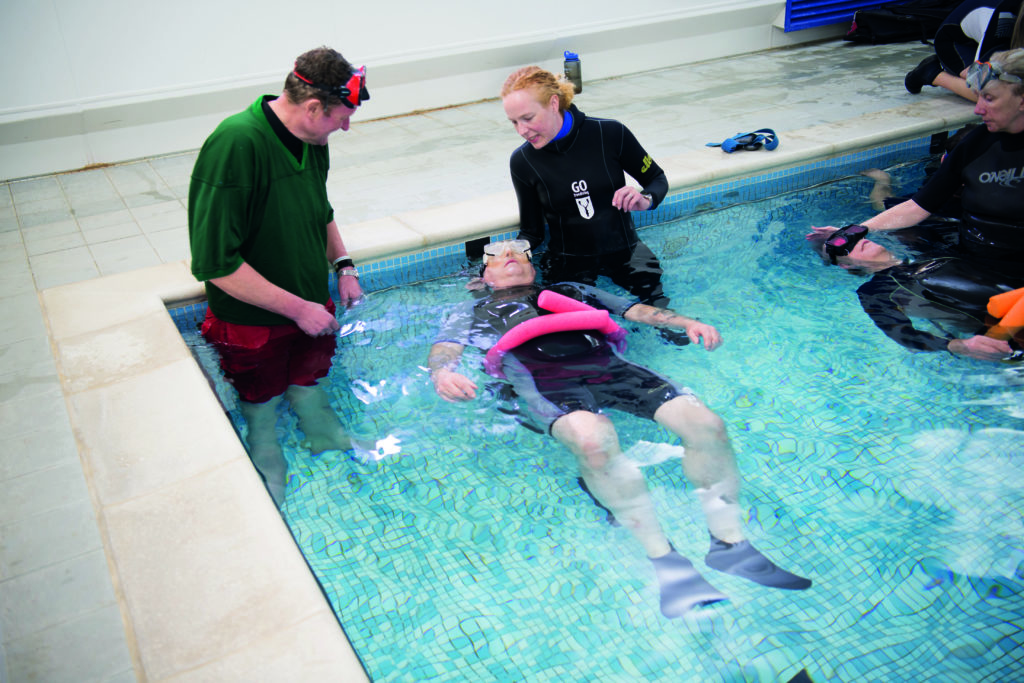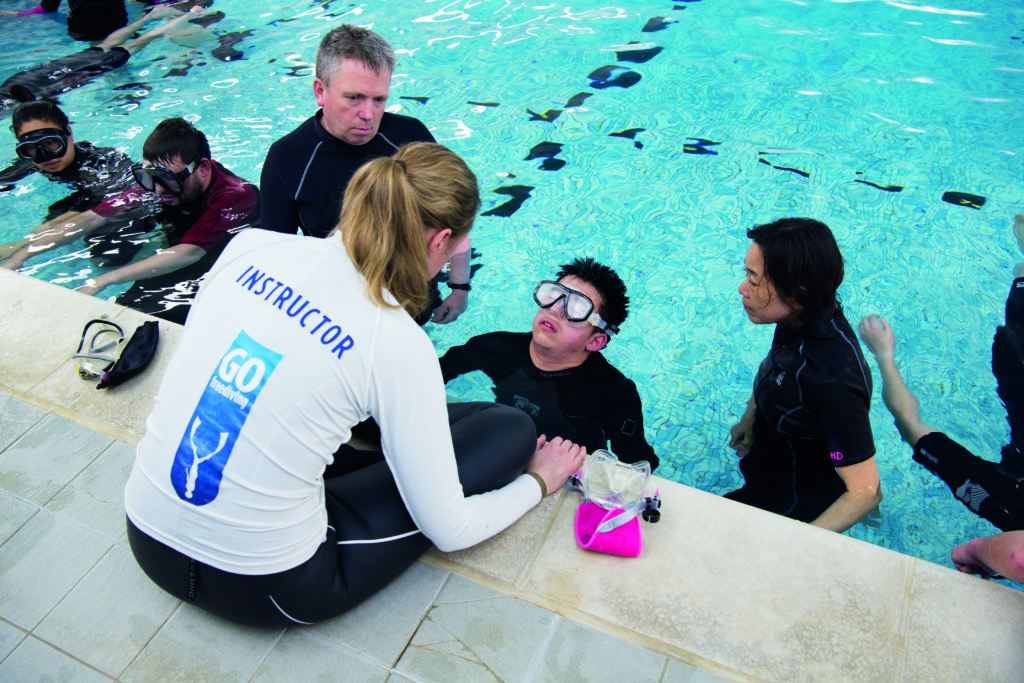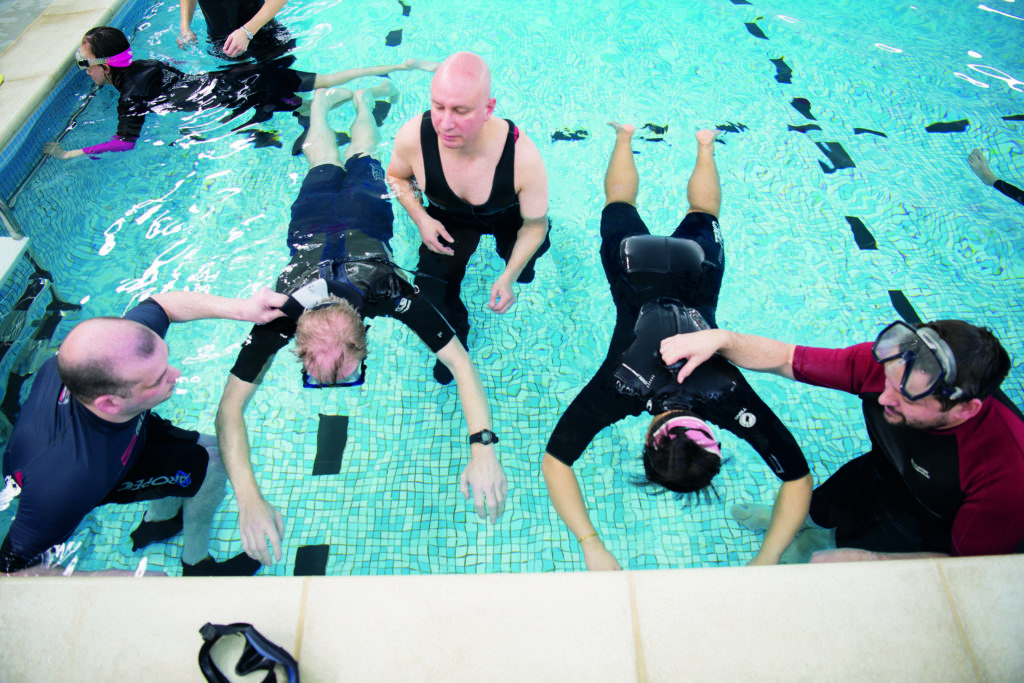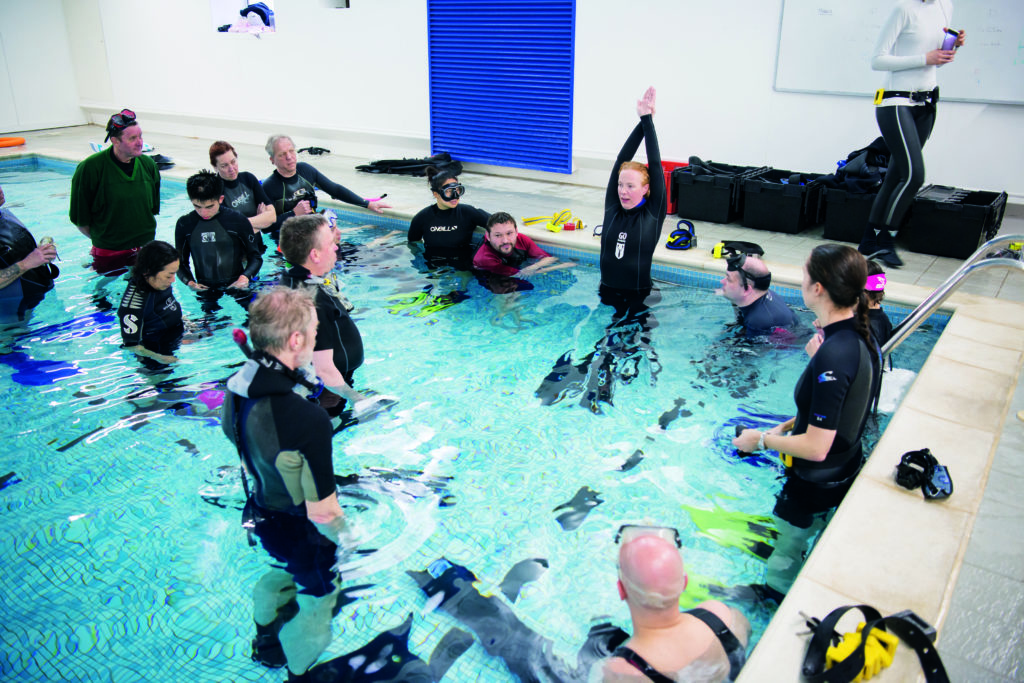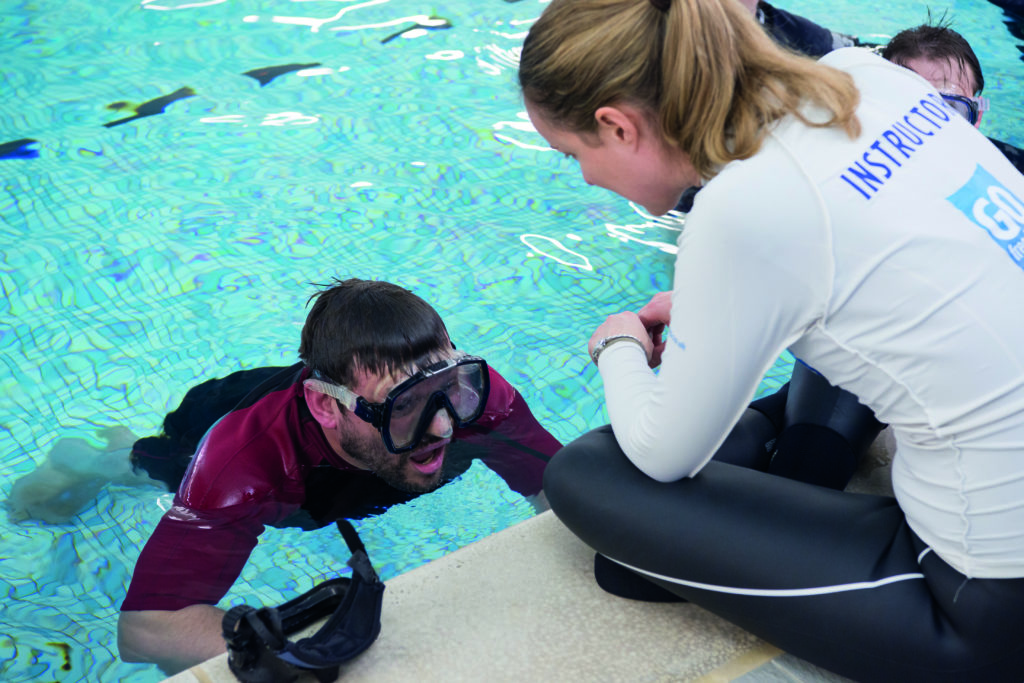UK freediving guru EMMA FARRELL challenges a group from Dive Ability, the diving charity for people with disabilities, to embark on a Try Freediving course. Photography by ROB WHITE
When you think of a freediver, who do you picture? Tanya Streeter in her silver suit and waist-length blonde hair diving deeper than any human before her? Or William Trubridge swimming breaststroke down and back to 100m plus? Think it’s only the super-fit who can free dive?
Also read: New on Netflix: The Deepest Breath
But what if you’re missing a leg? Paralysed from the waist down? Paralysed from the neck down? Can you still freedive?
Since starting my freediving teaching career in 2003, I’ve worked with many people facing challenges to their breathing or physical movement in the water, but this work became more structured when I worked with Paralympic swimmers in the run-up to the Rio Paralympic games, as part of the team that helped them to achieve 30 medals in the pool.
When I was approached by the charity Dive Ability about giving disabled scuba divers a taste of freediving, I saw it as an amazing opportunity to share my knowledge and open up the freediving world to more people. I took along two of my instructors, Zoe and Jorgen (Team Strandquist), and we taught an adapted version of our Try Freediving course.
The Try Freediving course combines theory and breathing exercises with exercises in the pool. Students first practise static apnea (holding your breath while lying still on the surface), and dynamic apnea, which is swimming lengths under water, with or without fins. We would bring this course to divers with quadriplegia, cerebral palsy, multiple sclerosis, Asperger’s syndrome, missing limbs and multiple conditions.
‘Teaching the members of Dive Ability was a joy as they could discover for themselves that everyone can learn to freedive’
When I teach the Try Freediving course to able-bodied students, I always stress that freediving is for everyone, and mention several record-holders in their 50s and beyond. This definitely resonated with the Dive Ability members, who often embrace challenges that others feel might not be possible for them.
Matt Colliard, the charity’s information officer, is also quadriplegic, and an Advanced Open Water Diver. “If you’ve got the right people around you and the right support, you can have a go at almost anything,” he told me. He works to show disabled people just what they can achieve both in and out of the water, and was really keen to give freediving a go.
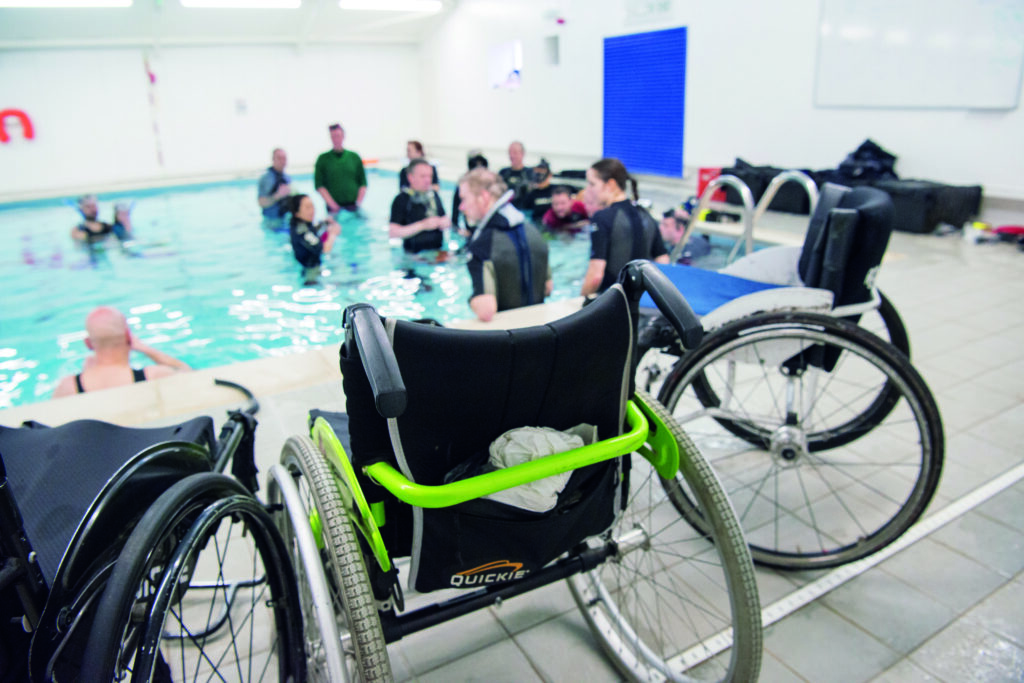
When we teach static apnea, we have certain procedures for starting and finishing the breath-hold. If a suit is buoyant enough, we start people off lying on their backs in the water. This works well if the body is relaxed and loose, but with some physical disabilities this can be uncomfortable, so we had to adapt the position to suit each diver.
Similarly, coming up, we like students to have both hands on the side of the pool and their legs underneath them with their feet on the bottom before they lift their head up to breathe. This was tricky for a lot of the students – so we used two buddies per diver to help bring them up from the static.
Correct buddying is key in freediving, and this was an opportunity to show just how important the buddy/diver relationship is. Not only was clear communication needed, but trust and a lot of hands on helping to ensure that the diver felt safe in the water.
For Matt, we had an added issue. Not only did he require two people to turn him onto his back and bring him up, but there was also the question of how he could communicate to his buddies during the static.
Sarah and Pedja were his buddies, and Zoe was instructing. When he had taken his pre-dive breath, they turned him onto his front and then Zoe got under the water so that she could watch his face the whole time. When he felt he wanted to come up he shook his head, and Sarah and Pedja whipped him out of the water so that he could breathe immediately.
“Sarah and Pedja know me really well and how to handle me under the water,” said Matt. “I closed my eyes during the breath-hold. The first time I wasn’t very relaxed and my mind was just telling me to breathe, and it seemed like a long time, so that’s when I gave the signal. It was barely 15 seconds.
But in the classroom you were talking us through relaxing before we actually turned over, so the second time I knew what to expect and knew that my buddies could turn me over quite easily. So, progressively, I got more into the relaxation techniques. I was just trying to shut everything out and relax and enjoy the experience.
“My last hold was just under a minute. I reckon if I did it regularly it would definitely increase. But it really surprised me that it was a minute. The first and second breath-holds felt like a very long time, but the last one was much longer and I felt more relaxed. I could hold my breath for longer because I was relaxed.”
After the static, which boasted times for some people of more than two minutes, we moved onto dynamic apnea. For most of the scuba divers this was tricky, because they were either missing a leg, or didn’t have enough use of their legs. For Mark, an amputee, we put one lightweight and smaller carbon fin on and he was away, swimming so fast that I struggled to keep up with him.
For the others, we concentrated on dynamic no fins, using the power of their arms to keep them propelled. This is incredibly effective and was the technique I used with TV presenter Arthur Williams, who is paraplegic, when I taught him to freedive for a Channel 4 TV show.
Once we had got the weighting right for each student, and enough buddies for safety, we used the whole of the pool to explore freediving.
I love teaching beginners to freedive, because they are always surprised and amazed at how well they have done. Teaching the members of Dive Ability was a joy, because they could discover for themselves that everyone can learn to freedive. For Zoe, Jorgen and me, it was also an opportunity to donate our time and expertise to an amazing cause and a bunch of fantastic people.
And the last word must go to Matt, who says to all disabled people he meets: “My motto is: Stop sitting at home. There are opportunities out there. We’ve got the right people, the experience, the equipment – it’s about getting out the chair and doing something different”.
If you’d like to take part in freediving or scuba diving with Dive Ability, check out its website.
Go Freediving: Emma Farrell is one of the world’s leading freediving instructors and the owner of Go Freediving, which provides freediving courses, holidays and events. She is the author of the book One Breath, A Reflection On Freediving, has appeared many times on TV and has worked with top-level Olympic and Paralympic athletes to improve their performances using freediving and yoga techniques.
Photographs by Rob White / marinepix.co.uk
Also on Divernet: Powell & Farrell Dive Into New Roles

